How Weekly Cemetery Outings Created My Rich Family History
Weekly Outings to the Cemetery
While some of our classmates went to the park or to the movies, my brother and I spent many weekends at the Jewish cemetery in Lodz, Poland where we grew up. Why would we choose such a depressing place? At first, the choice wasn’t ours. My father, who had no living relatives left in Lodz after WWII, would visit the graves of his parents Rachel Leah and Chaim Chaskel (Yechezkel in Hebrew.) Here he could feel close to family because those that were murdered had no graves he could visit and pay his respects.
At the cemetery, our father would spin tales about the grandparents we never met. In my mind’s eye I can still see Rachel Leah with her pink cheeks—royte bekelach— my father used to say, even though I only know her from her unusually modern grave erected in 1936. My father would speak of the delicious cholent she made for Sabbath meals, that he himself would bring home from the neighborhood bakery where it cooked. I could almost smell the braised flanken and beans and potatoes from my father’s words alone. I was transported to my grandmother’s kitchen and away from the bleakness of the cemetery.
My father did much the same as we visited the more old fashioned grave of my grandfather Chaim Chaskel, telling us of his carpenter’s tool chest hidden under the bed. Its assortment of tools was a source of wonderment to young Nachman. Often my father would sigh and say, “My parents had the wisdom to die before the Holocaust. What suffering they were spared!” When I was very young these words made little sense, but the frequent cemetery visits became a special time: story time and a kind of odd urban “gardening” time. We always carried tools to pull weeds around the graves: clippers to cut the overgrown branches, brushes to sweep the debris and pine cones, and a damp rag to clean and polish the headstones.
Never Forget
After our clean up tasks on both graves were done, my father would be our intrepid tour guide. We’d walk along the long wooded paths of the cemetery and watch as he pointed out mausoleums of the rich, and tombstones of Jewish luminaries. He never failed to stop at the Jewish Socialist Bund memorial and speak to us about the Bund’s ideals and how he was a youth leader in its children’s division, SKIF. The tales of his countryside experiences with campers were so much fun, we hardly remembered we were at a sad place. But then, before the end of most visits, he’d take us to the back wall of the cemetery bearing hundreds of bullet holes. “This is where many inmates of the Lodz ghetto were executed,” he’d say and stare at the wall for much longer than our young patience allowed. “Never forget this,” he’d repeat his mantra.
Shortly before we emigrated to Israel, my father took us to the cemetery one last time. In particular, he wanted to show us that he added my grandmother’s name in Roman characters. Until that time all the words on the plaque were in Yiddish. “If one of these days you return here and can’t read Yiddish, or if your children, or their children come in the future, you’ll be able to find your grandmother.” Unfortunately, there was no space on my grandfather’s tombstone to add his name in Roman characters to the others, which in his case were carved in Hebrew.
The difference in the languages used on the two gravesites may be of interest. My grandfather was a more religious man and he passed away when Nachman was younger, and could not influence the use of language on the stone. Most likely his oldest religious brother Jacob decided to use Hebrew, the holy language. By the time Rachel Leah passed away, Nachman asserted his preference for Yiddish, his mamme loshn—mother tongue. Though the Hebrew and Yiddish characters look the same, the words are not.
Another visit, Thirty Years Later
Thirty years later I returned to the cemetery with my father. It was an extremely emotional and heartbreaking experience. We found grandmother’s tombstone broken and grandfather’s completely gone, save for a fragment bearing his name.
That is a story unto itself, detailed in my book, The Unlikeliest of Places: How Nachman Libeskind Survived the Nazis, Gulags and Soviet Communism.
Purchase my book, In the Unlikeliest of Places: How Nachman Libeskind Survived the Nazis, Gulags, and Soviet Communism on Amazon today! Read an excerpt here.
Connect with me on Twitter, Facebook, Google+, LinkedIn, and Pinterest, and please take a look at my events page for all my recent happenings.
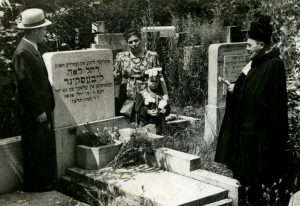
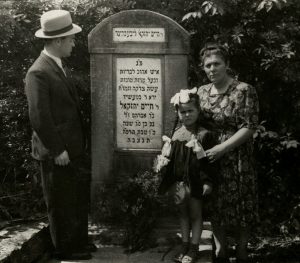
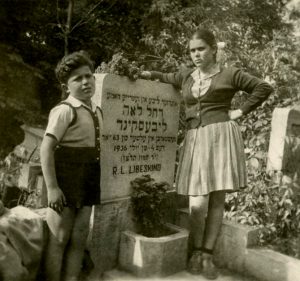
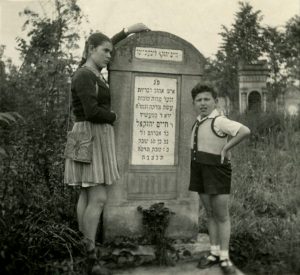
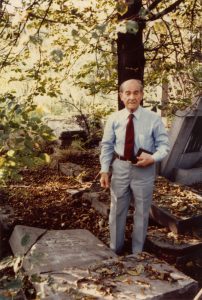
Beautifully written and very poignant. May all their memories be for a blessing.
Thank you for being a reader of my blog, Sol. Yes. Memories of our loved ones are definitely a blessing, even the ones we know only from stories. This is why stories need to be told and retold.